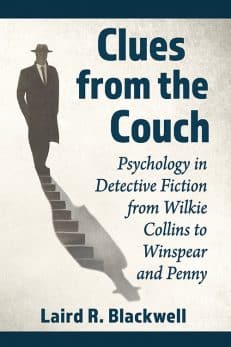Clues from the Couch
Psychology in Detective Fiction from Wilkie Collins to Winspear and Penny
Original price was: $55.00.$29.99Current price is: $29.99.
In stock
About the Book
The detective story—the classic whodunit with its time-displacement structure of crime—according to most literary historians, is of relatively recent origin. Early in its development, the whodunit was harshly criticized for its tightly formula-bound structure. Many critics prematurely proclaimed “the death of the whodunit” and even of detective fiction altogether. Yet today, the genre is alive, as contemporary authors have brought it into modern times through a significant integration of elaborate character development and psychology. With the modern psychological detective story emerging from the historical cauldron of detective fiction and early psychology, the genre continues to develop a complexity that reflects and guides the literary sophistication needed. This book, the first of its kind, analyzes over 150 whodunit novels and short stories across the decades, from The Moonstone to the contemporary novels that saved the genre from an ignominious death.
About the Author(s)
Bibliographic Details
Laird R. Blackwell
Format: softcover (6 x 9)
Pages: 248
Bibliographic Info: bibliography, index
Copyright Date: 2022
pISBN: 978-1-4766-8837-4
eISBN: 978-1-4766-4670-1
Imprint: McFarland
Table of Contents
Preface 1
Introduction: The Detective Story in Transition 7
One. Psychology: A Brief Look at Some Psychological Concepts Applied to the Classic Whodunit 21
Two. An Illustrative Case: The Transition from the “Straight” Whodunit to the Psychological Whodunit—from Ellery Queen I to Ellery Queen II 32
Three. Key Authors and Featured Works with an Infusion of Psychology 36
Four. 1868–1909: Undercurrents of the Unconscious Before Freud and During His Early Work 83
Five. 1910–1919: Freudian Psychology and the First Psychological Detectives 90
Six. 1920–1929: Psychological Detectives, Professional and Amateur 99
Seven. 1930–1939: Psychology as Genuine Player and as Red Herring 112
Eight. 1940–1949: The Post–Golden Age and the Eruption of the Unconscious 135
Nine. 1950–1959: Psychiatrists, Defense Mechanisms, and the Invisible Witness 155
Ten. 1960–1969: P.D. James, Ruth Rendell, and the Psychological Exploration of Character 170
Eleven. 1970–1979: The Passing of Hercule Poirot and a Legacy of Generativity 176
Twelve. 1980–1989: Surface Appearance and Psychological Reality 187
Thirteen. 1990–1999: The Whodunit as the Sauce for Psychology’s Entrée 193
Fourteen. 2000–2009: Back to Vienna 200
Fifteen. 2010–2019: Two Strands—Freud and Feelings 212
Conclusion: Formula and Psychology in the Classic Whodunit 221
Bibliography 225
Index 233





